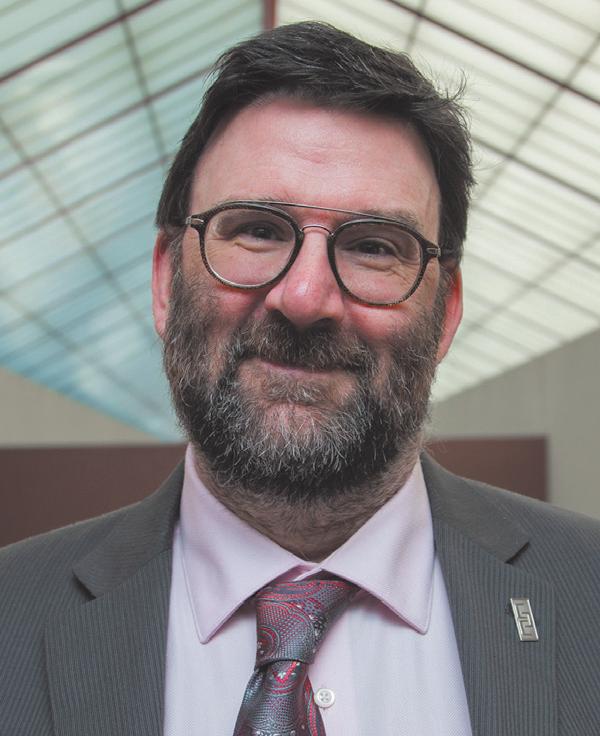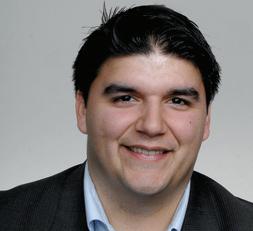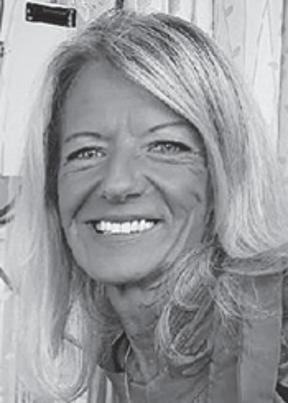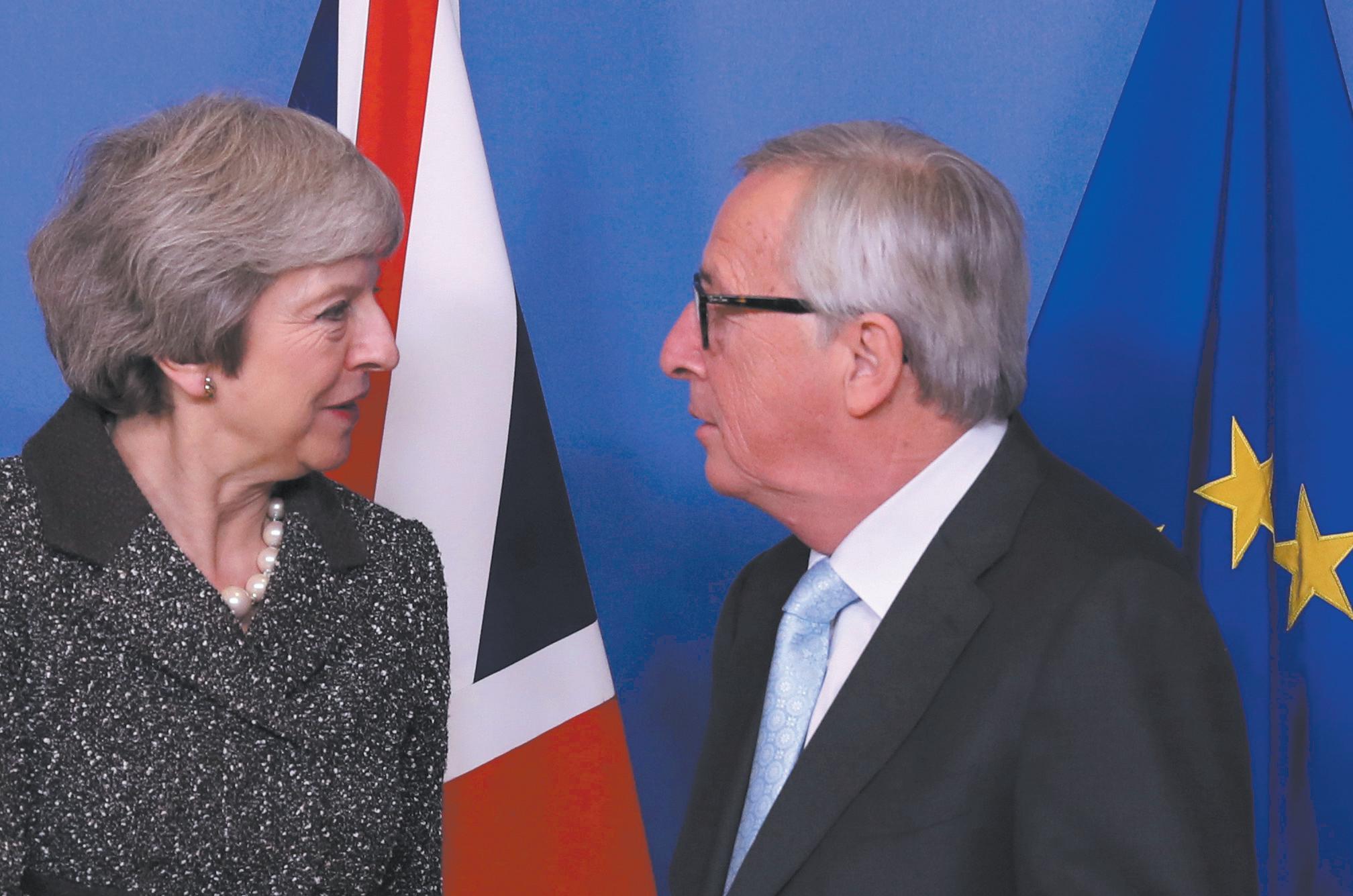






A city worker is receiving accolades for shutting down an out-of-control fire hydrant.
A video posted on social media shows Ryan Gallo turning a valve while working in midst of water blasting more than 10 metres into the air. Gallo would give the valve a few turns, briefly step out to gather himself and then step back in to do battle once more. After about 2 1/2 minutes, his perseverance finally paid off and the hydrant was no longer spewing water.

The video, posted by Paul Lacasse on the Hell Yeah Prince George Facebook page, drew the attention of Coun. Kyle Sampson, who made note of Gallo’s actions during Monday night’s city council meeting.
“He was in there, in the freezing cold, soaking himself just getting that thing shut,” Sampson said.
“It was like three minutes... really proud of working with the team here that has such great city employees.”
Gallo’s heroics occurred on Monday morning on Great Street near Terminal Avenue in the BCR Industrial after a truck either clipped or backed into the hydrant.
Mark NIELSEN Citizen staff mnielsen@pgcitizen.ca
B.C’s provider of legal aid has opened a special office in Prince George to lower the prevalence of Indigenous children going into government care.
Called the Parents Legal Centre, it’s located at 302-1488 Fourth Ave. in the Scotiabank building and is operated by the Legal Services Society.
The office works to increase the chances of families staying together, whenever appropriate, by providing services early on, preferably when a government social worker first contacts a parent about concerns for a child’s safety.
LSS lawyer Katrina Harry, who opened the first PLC in Vancouver in 2015, said a team made up of a legal assistant, advocate and a lawyer works with the family.
“They will not only support people with their legal matters, but help them tackle some of the issues that often result in the child safety concerns in the first place,” she said.
Services include a lawyer’s advice and representation at court, and at mediations and other collaborative meetings, and an advocate’s support throughout the process, including information, connecting parents to other services such as counselling, addictions treatment or housing, and advocating on their behalf.
“The root of many such cases is poverty – not neglect,” Harry said. “For example, sometimes a family just needs a decent roof over their head, but because good low-cost housing is hard to find, parents may lose their children. If we can solve the housing issue for a client, then chil-
dren can be at home.”
In addition to Prince George, LSS has opened PLCs in Smithers, Campbell River and Duncan. PLCs will also be opened in Kamloops, Williams Lake and Victoria in 2019 and the LSS regional office in Terrace will also offer PLC services. The PLC model was first tested in Vancouver, and was followed by a location in Surrey.
“Evaluations of the PLC in Vancouver showed a much more positive experience for clients going through this difficult and highly stressful legal situation,” said Harry. “As a result, we got funding from the Ministry of Attorney General to expand across the province.”
While the PLCs will focus on Indigenous families, the services are available to anyone who qualifies for legal aid.
“By focussing on the over-representation of Indigenous people in the justice system, LSS is taking a step towards reconciliation,” Harry said.
Indigenous people represent only six per cent of B.C.’s population, but 60 per cent of Indigenous children in the province have been removed from their homes and placed in government care. Of LSS’s legal aid clients whose children have been removed or are at risk of being removed, 40 per cent of them self-identify as Indigenous. In Prince George, 103 of the 126 children in care, or 82 per cent, were Indigenous, according to Ministry of Children and Family Development data for 2016/17.
The PLC in Prince George can be reached by calling 250-277-0100 or 1-866-577-2525 between 8:30 a.m. and 4:30 p.m., Monday to Friday. For more about eligibility, go to lss. bc.ca/legal_aid/childProtection.php.



MLA Shirley Bond chats with some seniors at her annual Seniors’ Tea at the Prince George Conference and Civic Centre on Tuesday. The event started with 80 seniors 11 years ago, and this year more than 860 seniors attended. Local businesses and organizations make the event possible with their support.
The College of New Caledonia has appointed Chad Thompson as its vice president academic. Thompson has held the position on an acting basis since December 2017.
“Dr. Thompson has shown exceptional aptitude as acting vice president academic throughout the last year,” said CNC president Henry Reiser.
“We’re honoured to appoint him permanently to the role.”
Thompson began his career at CNC in September 2012 as the dean for the college’s school of university studies and career access.
In the 1990s and early 2000s, Thompson worked on post-secondary reform projects in Central Asia and the former Soviet bloc. He also held the position of assistant professor of social sciences at the University College of the North in Thompson, Man.
“One of the things that brought

me to B.C. was the unique nature of the college system,” Thompson said. “It offers students, whom otherwise would not succeed in post-secondary education, an affordable access point. Colleges give students the opportunity to explore different fields, discover their passions and, if necessary, to have a second chance.”




A proposal to exempt trading and collectible cards from a requirement under the city’s secondhand dealers and pawnbrokers bylaw that they be held for 30 days before they can be put up for sale was advanced to the public hearing stage during Monday night’s city council meeting.
Kelsy Polnik of Game Quest has been pushing for the exemption, similar to one made in 2014 for video games.
But Prince George RCMP is opposed to the idea, saying the cards can be valuable, making them a target for thieves looking for some quick cash.
And if they come with paperwork authenticating them, police say tracing them back to their owners is possible with the help of the 30-day holding period.
Staff has advised council to take the RCMP position into account but, for the time being at least, pass the amendment through first and second reading so it can be taken to a public hearing.
City council approved appointments to four committees on Monday night.
Coun. Garth Frizzell will chair the finance and audit committee. Mayor Lyn Hall and councillors Frank Everitt and Cori Ramsay will also sit on the committee.
Coun. Brian Skaun will chair the intergovernmental resolutions committee, which will also include councillors Susan Scott and Kyle Sampson.
As well, Hall was appointed the city’s representative on the Prince George Community Foundation and Coun. Murry Krause the city’s representative on the Prince George Treaty Advisory Council with Skakun the alternate.
City council gave staff the go ahead Monday night to seek as much as $10 million from the federal and provincial governments to put towards construction of the new Four Seasons Leisure Pool.
However, it’s doubtful the city will land the full amount, staff advised in a report to council because there is only so much money to be doled out. Staff was directed to submit an application to the Investing in Canada Infrastructure Program, which sees Ottawa cover up to 40 per cent and Victoria onethird of eligible costs. In all, $134.84 million has been earmarked for the program. The current budget for the pool is $42 million with $35 million to be borrowed after that move was approved in a referendum last year.

Glen KORSTROM Glacier Media
Members of the Kwaw-kwaw-Apilt First Nation are clashing with Canadian and provincial laws by operating a cannabis store near Chilliwack and First Nations advocates say the federal government should have foreseen the conflict.
Ottawa signed a pact with provinces in the spring that requires provincial governments to charge a 10 per cent excise tax on cannabis sales and allows provinces to get 75 per cent of the estimated $400 million in annual proceeds from that tax.
Assembly of First Nations national chief Perry Bellegarde also wants First Nations to share that revenue.
First Nations were left out of that revenuesharing agreement despite First Nations Tax Commission chief commissioner Manny Jules and other advocates urging the federal government to treat First Nations as an 11th province.
“You would think that they would have anticipated that if they didn’t include First Nations, this would be one of the eventual outcomes,” Jules said.
“This was an incredible opportunity for true reconciliation, as a major part of (Prime Minister Justin Trudeau’s) campaign plank, which was to legalize cannabis. This will ultimately be a multibillion-dollar or multitrillion-dollar industry, so I want to have First Nations as a fundamental part of that in a legitimate way. I don’t want to create grey markets.”
Sandra Hudson and Darwin Douglas opened their Indigenous Bloom cannabis store on their reserve near Chilliwack in early July and were raided by the Chilliwack RCMP on July 12.
That same day, coincidentally, the Kwawkwaw-Apilt First Nation passed the final reading of its own law, which it considers to be a replacement for Canada’s Cannabis Act.
It then authorized Indigenous Bloom to reopen the next day.
The RCMP have yet to raid the store a second time, said RCMP spokesman Cpl. Mike Rail. He declined to comment on whether the police are investigating the store or whether another raid is being contemplated.

The province’s stance is clear. The Ministry of Public Safety and Solicitor General said that B.C.’s laws are of “general application and apply across the province.”
B.C. law requires all non-government entities that want to operate a cannabis store to get a provincial licence. That process involves filling out forms and having principals pass a criminal record check.
The Ministry of Attorney General would not say whether Indigenous Bloom has applied for a provincial licence.
Hudson said that she and Douglas have a right to operate their store because of the Kwaw-kwaw-Apilt First Nation’s law but declined to say whether the two have applied for a provincial licence or where they are getting their cannabis.
It’s unclear how the courts would rule if the
Citizen staff
Coast Hotels issued 72-hour lockout notice Tuesday morning to its unionized workers at its operations in Prince George, Nanaimo and Victoria, Unite Here Local 40 says.
In response, the union says it will be holding a rally at Coast Inn of the North today at 4:30 p.m.
It says the lockout threat affects more than 250 workers and their families in the three cities. Independent of the lockout
notice, Laird Cronk, the new president of the B.C. Federation of Labour, has called for mediation between Unite Here Local 40 and Coast Hotels after workers at Nanaimo’s Coast Bastion held a one-day strike on Saturday. The union and the company have agreed to emergency mediation today and Thursday. The union has set a deadline of midnight Thursday to reach a settlement and has called on the labour movement to pull business from the hotels if no deal is reached.
Citizen staff
Reveen once again brings his mesmerizing hypnosis show to Vanier Hall on April 13.
The show has been seen by more than six million Canadians and last took to the stage in Prince George in 2017.
This show features Tyrone Reveen, son of Peter, who created the original show.
Reveen will offer up audience members as the stars of the show as he creates hilarious scenarios only the hypnotized can provide.


matter ended up before a judge.
Donovan & Co. associate Kenji Tokawa said that First Nations may derive their authority to regulate cannabis on their reserves and territorial lands from bylaw-making power regarding business licensing (from the Indian Act or land code), Aboriginal title or other Aboriginal rights or their own Indigenous legal orders.
“We don’t know what would happen,” Tokawa said, adding that some First Nations have land codes and can make their laws under those codes.
“They don’t need to rely on the Indian Act for that power. These laws can include the licensing of businesses.”
Indigenous nations as political entities existed long before the imposition of Canadian and provincial law and continue to exist, Tokawa said.



mnielsen@pgcitizen.ca
An Enderby man will remain guilty of a “driving rampage” through Prince George streets after a B.C. Supreme Court Justice dismissed an appeal of the verdict.
Dustin Daniel Heltman was sentenced in November 2017 to a further 257 days in jail followed by 18 months probation for a Nov. 14, 2015 incident that began when, while driving a van, he knocked a small utility trailer off a pickup truck near the College of New Caledonia before speeding off. Heltman, who had been prohibited from driving at the time, wound his way to the VLA, blowing through red lights, reaching speeds of up to 100 km/h and driving up onto a sidewalk to avoid RCMP, smoke pouring out of his van.
In passing sentence at the time, provincial court judge Thomas Woods variously described Heltman’s actions as a “driving rampage,” an “episode of colossally-dan-
gerous driving,” a “consummate display of callous disregard for others” and “violent, out-of-control, highly dangerous conduct on his part that held the potential to cause calamitous consequences.”
Heltman’s appeal hinged on how Woods treated the accused’s testimony and that of a witness Crown had called in response.
In a decision issued Tuesday, Justice Marguerite Church agreed with defence counsel that Woods erred in treating the witness’s testimony as a direct rebuttal of Heltman’s testimony but found it had no impact on his verdict.
Heltman was arrested after the fact and the matter was taken to trial largely over matters of identification and Heltman’s claim he had an alibi. Woods found Heltman’s story lacked credibility, noting his memory “failed him utterly” when asked about what he was doing at the time of the incident.
Woods found him guilty of five offences, including dangerous driving, fleeing the scene of an accident and fleeing police.

After a hiatus of more than two years, Petronas Energy Canada is back in the field in northeast British Columbia, as it begins drilling to underpin its share of natural gas for the LNG Canada export project, a senior executive said last week.
However, the former Progress Energy Canada has no plans to return to the frenetic pace of 2013-2014 when it was running nearly 30 rigs continuously in the area, Dennis Lawrence, vice-president of production, told a B.C. Montney technical session organized by the Canadian Society for Unconventional Resources. “Every single person in Northeast B.C. was running flat out.”
This time around, the pace will be more measured with the company looking at 40 years of steady rational development in northeast B.C., he said.
“That’s better for our business. It allows us to optimize, it allows us to plan properly and it is better, quite frankly for the communities in which we operate.”
Petronas Canada started with one rig in October of this year and will add a second one at some point in 2019, said Lawrence. It envisions gradually building up to four to six rigs and a couple of hydraulic fracturing spreads for the next 30 plus years.
The company is currently drilling the fourth well on its first “start-up” pad and the second well is already faster than any of its other 600 Montney wells.
However, not all Petronas gas from northeast B.C. will go to the LNG Canada facility, said Lawrence. “We will be moving a lot of gas out of northeast B.C. and we have got some of those avenues opened up to us now and we made some commitments but we are not done yet.”
Formed in the early 2000s, Progress Energy spent the following few years acquiring land in northeast B.C. north and west of Fort St. John and building a land position. In the 2011-2012 period, it shifted to proving the resource and Petronas became involved, first as a joint-venture partner and then as the owner of the company.
Between 2012 and 2015, Petronas was very much focused on delineating the resource with an LNG project clearly in mind as it drilled a grid of wells across the land base. “We were really figuring out what we had and assessing the quality of the resource across the entire suite of our lands,” said Lawrence.
The company drilled three-mile grid drilling pads with each pad typically having three wells – an Upper, Middle and Lower
We have pivoted… we are already taking the first steps in that strategy and the LNG Canada investment over the last year or so is a huge first step in that strategy.
— Dennis Lawrence
Montney. The wells were drilled with similar lateral lengths, well designs and completion techniques. “That was done very deliberately because we wanted to keep as many things as we could the same so you would get a true picture of the quality of the resource across our lands.”
However, what that meant was that while Petronas started with a state-of-the art well design in 2013 and 2014, due to rapid changes in the industry its new wells will be very different from those delineation wells, he said. The current well design is a 2,600 metre lateral with about two tonnes per metre of proppant. Although the company feels that is the “sweet spot,” it will continue experimenting with that, the session heard. Petronas also has begun construction of two gas plants in the heart of its Montney lands and significant pipeline infrastructure needed to connect those plants with some of its existing compressor stations.
In the wake of lower natural gas and LNG prices, the company paused between 2016 and 2018 to reset its strategy, figuring out how it could monetize its resources. Petronas had been working on its own LNG plant at Prince Rupert but opted not to proceed, deciding instead to participate as a partner in the Royal Dutch Shell plc-led LNG Canada plant at Kitimat.
“We have pivoted… we are already taking the first steps in that strategy and the LNG Canada investment over the last year or so is a huge first step in that strategy,” said Lawrence.
From 2019 forward, “it’s about executing that strategy and in essence finding ways to monetize that 60 plus tcf resource that we have on our lands.” He also noted that the cost of feedstock is a big part of the overcall cost of LNG and “we only see it going down over time.”
Petronas has nearly 1.5 million gross acres in northeast B.C., of which about 900,000 gross acres are Montney rights. It also has about 800 active wells of which just over 600 are Montney producers.


RCMP outside of the Queensway Court Motel on May 1 morning where a shooting took place. Harley
sentenced Tuesday for robbery with a firearm while charges against Donald
staff
A Prince George man was sentenced Tuesday to a further 21 1/2 months in jail for his role in an incident at a local motel that left a man with a gunshot wound.
Harley Raymond Poole was issued the term in provincial court for one count of robbery with a firearm from the May 1 incident at the Queensway Court Motel. Poole had remained in custody since his arrest
three days after the incident for a total of 187 days.
In June, charges of attempted murder with a firearm and intentionally reckless discharge of a firearm against Poole were stayed.
Donald Justin Johnny Baker continues to face eight counts, including attempted murder, and remains in custody.
In September, city council unanimously upheld a decision by city staff to suspend the motel’s business licence for six months effective Oct. 1.
Hina ALAM Citizen news service
VANCOUVER — Climate change is causing glaciers atop Mount Meager in British Columbia to shrink, increasing the chances of landslides and even a new eruption, says an expert studying the volcano.
Glyn Williams-Jones, a volcanologist from Simon Fraser University has been studying the fumaroles, or gas venting, of water vapour, carbon dioxide and hydrogen sulphide from the volca-
no for about two years. He and his team of students are also examining the increased risk of landslides caused by receding glaciers on the volcano.
Williams-Jones said the release of the gases worries him.
“The reason those fumaroles are coming, we believe now, is not because the volcano is more active but rather because of warming climate... those glaciers have been getting thinner,” he said.
“There is this interplay between climate, ice-covered volcano and
the response of those volcanoes.”
The churning gases don’t mean an eruption is imminent, he said, but the volcano is definitely not extinct. Mount Meager is northwest of Whistler and was the last volcano in British Columbia to have a large explosive eruption, which was 2,400 years ago.
“That’s a blink of an eye in geological terms,” Williams-Jones said. “It is a grumpy volcano in the sense that it has had some very large eruptions and also had these extremely large landslides.”
Camille BAINS Citizen news service
VANCOUVER — A top executive at Chinese tech giant Huawei who was arrested in Vancouver has been released on $10 million bail and must agree to wear an electronic tracking device.
Meng Wanzhou, 46, is wanted by the United States on allegations that the company skirted trade sanctions against Iran.
Justice William Ehrcke of the Supreme Court of British Columbia said Tuesday he is satisfied Meng, a well-educated businesswomen with letters of reference, does not pose a flight risk.
He placed 16 conditions on her release, including that she remain at her home in Vancouver between 11 p.m. and 6 a.m. unless she gets prior written permission from her bail supervisor or from the court or for medical reasons, and that she surrender her two passports and any travel documents.
Ehrcke set bail at $10 million, with $7.5 million of it in cash.
Meng was arrested on a warrant that alleges she committed fraud because Huawei used unofficial subsidiary Skycom to do business with Iranian telecommunications companies between 2009 and 2014 in violation of international sanctions.
The chief financial officer of Huawei has denied the allegations through her lawyer in court, promising to fight them if she is extradited to face charges in the United States.
After Meng’s release, Huawei released a statement saying it has “every confidence that the Canadian and U.S. legal systems will reach a just conclusion.”
“As we have stressed all along, Huawei complies with all applicable laws and regulations in the countries and regions where we operate, including export control and sanction laws of the UN, U.S., and E.U.”
Meng’s lawyer, David Martin, found a number of friends and associates to vouch for his client’s
character and to offer financial guarantees that she will not flee.
Additional sureties were needed after Ehrcke questioned whether her husband, Liu Xiaozong, could sign a guarantee.
Court heard Liu is living in Vancouver on a six-month visitors visa and Ehrcke said the form to provide a financial guarantee must be provided by a resident of B.C.
John Gibb-Carsley, a federal prosecutor representing the attorney general of Canada, asked the judge to deny Meng’s request for bail, saying she has the financial means to flee and has no connection to Vancouver, despite owning two homes in the city. Martin said although Liu’s visa is set to expire in February, he has come and gone from Canada over the last 15 years, has a record of compliance and could apply for an extension to stay in the country.
“He’s a rich capitalist, he can do his functions anywhere he is,” said Martin.
Along with the independent sureties, Martin also proposed his client be monitored by a firm that employs former police and military personnel and by another company that monitors people with electronic bracelets.
Ehrcke said Meng is being held on a provisional warrant and the United States has 60 days to make an extradition request. She has been ordered to appear in court on Feb. 6 to fix a date for further proceedings.
Huawei was founded by Meng’s father, Ren Zhengfei. The company has projected 2018 sales of more than US$102 billion and has overtaken Apple in smartphone sales.
The bail hearing began Friday with Gibb-Carsley outlining the allegations against Meng. According to court documents filed by the U.S. Department of Justice, Meng faces “multiple criminal charges” and each charge carries a maximum sentence of 30 years in prison, if she were convicted.

Editor’s note: This editorial that first appeared in the Dec. 23, 2016 edition of The Citizen has been updated for today in light of the CBC’s announcement Tuesday to resume playing the controversial Christmas song after banning it last month.
Christmas just isn’t Christmas anymore without a fresh debate about Baby It’s Cold Outside. This Christmas carol for adults featuring a call and response between a woman who thinks it’s time to go and the man who wants her to stay has been covered by everyone from Ella Fitzgerald and Sheryl Crow to Ray Charles and Willie Nelson.
It’s the closest thing to a romantic and sexy holiday song out there, even though it makes no reference to Christmas at all.
Michael Bublé and Idina Menzel recorded a traditional version of the song a few years ago while two gay male characters sang it on the TV show Glee and Zooey Deschanel and M. Ward reversed the genders when singing it in 2011.
Seen solely through the context of rape culture, however, the lyrics are problematic from the “say, what’s in this drink?” line to “I ought to say, no, no, no, sir” and his response of “mind if I move in closer?”
Seen in isolation from the rest of the song, those lines are worrisome but the entire lyric reveals ambivalence in the female character, who is clearly smitten by the “nice and warm” welcome she’s received in the man’s home. Her interest in staying is obvious but she worries about what people will think if she stays over. In that light, some people have gone so far as to interpret the song as a feminist anthem depicting the social pressures on women to repress their sexual desire.
away the tears, just close your eyes dear.”
Canadian rockers Evans Blue covered it with a male lead vocal. The arrangement gives the song an accompanying musical ferocity but there’s no getting around that lyric, no matter how emotionally sensitive he tries to sound.
Seen in the light of an already established relationship, the song is a playful and sexy interaction between two equals.
Spot the clever song that can be interpreted any number of ways. Song lyrics have always been places for singers past and present to challenge their audiences.
The Police’s Every Breath You Take is a first-person take on a stalker but Sting’s soft voice and the musical accompaniment either makes it more sinister or more palatable, depending on your perspective.
One of Sarah McLachlan’s best-known hits, Possession, is a blatant rape fantasy, with its terrifying chorus: “I would be the one to hold you down, kiss you so hard, I’ll take your breath away, and after, I’d wipe
Modern music, particularly heavy rock, is littered with lyrics of sexual conquest from Nine Inch Nail’s Closer to Led Zeppelin’s Whole Lotta Love to virtually every song by AC/DC. And the blatant sexuality of many of today’s top hiphop records would either make Robert Plant blush or jealous he didn’t write the lyric first.
That’s not an argument to just get over it about Baby, It’s Cold Outside but to put the song, first recorded in 1944, into both a musical, historical and social context.
Then and now, saying “what’s in this drink?” is a winking inference that whatever is done or said next, it’s not my fault, it’s the booze talking.
The repartee of Baby It’s Cold Outside also displays familiarity between the male and female characters, in stark contrast to the regular one-night love affairs sung

FortisBC’s recently announced nine per cent rate increase for natural gas, claimed to be as a result of the recent pipeline explosion right outside Prince George, neither holds up to evidence nor common sense and should be investigated as a matter of top priority by all levels of government and the B.C. Utilities Commission.
It’s not like we have a choice of gas providers or even alternatives to natural gas for heating our homes.
solely from the male perspective in so many contemporary songs. Seen in the light of an already established relationship, the song is a playful and sexy interaction between two equals. Within the safety of a romance where the boundaries have already been set, the pretend tug of war between one partner that wants sex and the other partner threatening to withhold it adds extra spice to the encounter. That would explain why the song remains so popular among couples.
The song works to this day, not because of its creepiness but because of the tension of competing desires of two adults both trying to do the right thing in the moment. The song ends with the tension unresolved, leaving it up to the listener to decide whether she stays or goes.
Baby, It’s Cold Outside is musical genius precisely because of its ability to absorb whatever agenda is in the mind of the listener, from innocent sweetheart to sexual predator.
The song is not completely one or the other, however, resting comfortably in that alluring middle ground of guilty pleasure for both parties.
Will they or won’t they is a story that will never get old, no matter how many Christmases go by.
Editor-in-chief Neil Godbout
—
This was a tumultuous year. And while truly exhausting in many ways, particularly due to we in the chattering classes constantly appropriating REM’s chorus, “It’s the end of the world as we know it.” Oddly enough, “I feel fine.”
To be clear, this is not due to some reassurance by the secret cabal of Alt-Right fanatics my critics say I answer to but rather thanks to the glimmer of sober and judicious thought that could clearly be seen in many quarters throughout 2018.


to the chagrin of his opponents, vulgar and elite, Peterson’s candid style and exhortations have touched a nerve across the globe.
As my first witness, I call forth editor-in-chief Neil Godbout and the square glasses people all over Canada who, while having almost no affinity for right wing whackjobs like yours truly, have started the long journey back to classical liberal ideals by doubting and criticizing the radical left.
If nothing else, 2018 gives us a sign that a new consensus is forming, beyond political lines, to address these concerns.
1) Lower income households will be hit harder because they tend to live in less energy-efficient homes and spend more of their incomes to heat them, and much of the annual increase will be concentrated in precisely the upcoming winter months.
2) From my own personal anecdote, my gas bill last February for my modest home was almost $400 after all the fees and taxes. A nine per cent increase would
Despite a short term spike in market natural gas prices, at present they are still at levels not seen since winter 2013, and the commodity is historically cheap in real, inflation-adjusted terms. While the cause of the pipeline explosion is still not known to general public (cue the conspiracy theories, but I digress), I must believe that events such as these are insured, so using it as a pretext for a price hike passed on consumers smacks of a greedy money grab at the most vulnerable time of the year with winter just setting in. It has been reported that the impact of the rate hike will average about 68 dollars a year. Well, two things come to mind:
have added $36 in that month alone. It has also remained unclear if the price hike is limited to customers in the north, or is also being passed on downstream to the coast and the U.S. where the pipelines are ultimately headed. It’s not like we have a choice of gas providers or even alternatives to natural gas for heating our homes. I am very thankful for the mild weather we have had in the region so far, but with all the advertising on social media (incidentally by FortisBC) advising us to turn our thermostats down, it would come as an ill-timed slap in the face if we get hit with a severe cold snap, or if we actually experience an unprecedented shortage.
I call on elected members at all levels of government to investigate FortisBC’s planned rate increase and why, even after the pipeline has been fixed, we are still being fed the line of significantly reduced capacity.
David Oh Prince George
LETTERS WELCOME: The Prince George Citizen welcomes letters to the editor from our readers. Submissions should be sent by email to: letters@pgcitizen.ca. No attachments, please. They can also be faxed to 250-960-2766, or mailed to 201-1777 Third Ave., Prince George, B.C. V2L 3G7. Maximum length is 750 words and writers are limited to one submission every week. We will edit letters only to ensure clarity, good taste, for legal reasons, and occasionally for length. Although we will not include your address and telephone number in the paper, we need both for verification purposes. Unsigned or handwritten letters will not be published. The Prince George Citizen is a member of the National Newsmedia Council, which is an independent organization established to deal with acceptable journalistic practices and ethical behaviour. If you have concerns about editorial content, please contact Neil Godbout (ngodbout@pgcitizen. ca or 250-960-2759). If you are not satisfied with the response and wish to file a formal complaint, visit the web site at mediacouncil.ca or call toll-free 1-844-877-1163 for additional information.
Subscribe to The Citizen and get the best in local news, sports, arts and more delivered to your door five days a week Call 250-562-3301 to subscribe today




SHAWN CORNELL DIRECTOR OF ADVERTISING
This is most often manifested by skeptical looks in the general direction of Our Dear Leader and his Merry Band of Cabineteers, whose policies resemble the fever dreams of sophomore students.
So as not to spoil their delicate gestalt, I will simply encourage left-leaning people of few hard political principles that yes, you have every right to wonder why the deficit is more than he promised, or why we have a migrant crisis in a seabound nation with one neighbour or what political points are gained by playing Mr. Dressup, excoriating faith groups, or tweeting money to Hollywood friends? Indeed, you may wonder these things and still call yourselves “liberal.”
In fact, the great lesson from 2018 is that one may very well dissent from the currents of identitarian outrage left or right, and simply object that the whole damn ship of civil society has veered wildly off course. And throughout the year, well written books backed up that very point.
Beginning in January, Jordan Peterson’s bestselling 12 Rules for Life called on people to improve the world by turning back to virtue in the classical sense: self-improvement through habits and striving for goals that incur responsibility. It’s still a top seller, giving the subtitle, An Antidote to Chaos, new bite. Clearly, much
Mailing address: 201-1777 Third Ave. Prince George, B.C. V2L 3G7
Office hours: 9 a.m. to 5 p.m., Monday to Friday
General switchboard: 250-562-2441 info@pgcitizen.ca
General news: news@pgcitizen.ca
Sports inquiries: 250-960-2764 sports@pgcitizen.ca Classifieds advertising: 250-562-6666 cls@pgcitizen.ca
While 12 Rules covered the personal, another work covered the socio-political: Jonathan Haidt and Greg Lukianoff’s The Coddling of the American Mind. Admittedly this book is directly related to the rising insanity of campus culture, from safe spaces to acts of serious violence. But the chaos on campus is a microcosm of the widespread frustration found throughout America and Europe between political parties, the media, celebrities, and protestors, both left and right. For those with shorter attention spans, there are no excuses: YouTube is clogged with engaging academics and journalists pushing back against polarization of all kinds. Even if one cannot be bothered to digest millions of hours worth of lectures, there is much to be gained by simply following these people on social media to see what articles they endorse –none are fake news. As a shortcut, I highly recommend you follow Quillette for all sorts of intelligent criticism.
It would be disingenuous for me to praise “civility” without confessing where I’ve gone wrong in these pages. Specifically, it is possible that my employment of the epithet “godless commies” was less than helpful. I promise to find a suitable replacement for all future columns.
However, I will repeat my concurrence with radicals left and right: we live at the end of the post-war era and what we demand in quality of life versus what we’re willing to sacrifice to attain it are scandalously irreconcilable. Political extremism is wrong but civic temperance is no substitution for the true courage necessary to name our problems and discuss solutions frankly.
If nothing else, 2018 gives us a sign that a new consensus is forming, beyond political lines, to address these concerns.
For that reason, and many more,
Shawn Cornell, director of advertising: 250-960-2757 scornell@pgcitizen.ca Reader sales and services: 250-562-3301 rss@pgcitizen.ca Letters to the editor: letters@pgcitizen.ca
Website: www.pgcitizen.ca
Website feedback: digital@glaciermedia.ca
Member of the National Newsmedia Council A division of Glacier Media



Frank PEEBLES Citizen staff fpeebles@pgcitizen.ca
One of the biggest forces in the classic tale A Christmas Carol is sweet and small. Tiny Tim is the light of daddy Bob Cratchit’s eye. The child is weak, vulnerable, walks with a makeshift crutch, but manages to thaw the ice in even the coldest of hearts.
The role has also been famously inhabited by girl actors a number of times and that is the case in the Judy Russell Presents version of A Christmas Carol on at the Prince George Playhouse. Nine-year-old Valen von den Steinen portrays the boy so feeble of body, but powerful of heart, that he charmed the dark soul of Ebenezer Scrooge himself.
“It’s my first play where I have to talk,” said von den Steinen who has nonetheless become a young veteran of the stage in a pair of past productions of The Nutcracker, the city’s dance festival and in numbers done at the Festival of Trees.
“I wanted to be in this play and have fun with the cast. Maybe I’ll become famous,” said the aspiring performer, who has every right to envision international spotlights.
Her aunt Tessa was a regular in Judy Russell productions in the past and her uncle Jesko is a veteran of Cirque du Soleil.
“True story: she walked into the studio one day (for weekly dance class) and caught wind that auditions were going on, so she walked over to (director) Anna Russell and said ‘I want to audition, please’ and Anna said ‘well, sure, why not?’ and just handed her a script, and she did it, all on her own,” said mother Karen von den Steinen.
“It’s fun to memorize the script,” said the ambitious upstart. “You always have something to do. I looked at the script a lot until we weren’t allowed to use them anymore. Suri (Fraser, a fellow child actor in the cast portraying a Cratchit kid) would test me. I like to hang out with my friends backstage and make each other laugh.”
Nothing cracks them up more than watching lead actor Gary Chappel intensely rehearse the acrimonious scenes of Scrooge until he loses track of the moment and bellows “line!” to prompt off-stage cues to help him get back onto the flow of the dialogue.
They also laugh watching the older actors do their warm-up exercises. They can often look
unorthodox and sound, to a child’s ear, completely hilarious.
“They’re always talking about adult things, like how the show was years ago,” said von den Steinen.
If she continues on this path of productions and competitions, plus the choir and school theatrics in Mrs. Bond’s class at Heritage Elementary School, she and her stage pals will be soon reminiscing about their own past shows.
“We’re excited to see her challenging herself,” said Karen.
“We’ve seen her do a lot of dancing, so it’s fun to see her now branching out and adding to her experiences on stage. And it’s time well spent.
“The cast really enjoy each other’s company and they are really supportive of each other. The more experiences you take on, the more your confidence grows, and we’ve seen that happening.”
Tiny Tim, Scrooge, Bob Cratchit and all the scenes of Christmases past, present and yet to come will be running at the Prince George Playhouse from Thursday to Dec. 22.
Tickets are available 24-7 at the Central Interior Tickets website or at the theatre door while supplies last.
Sarah L. KAUFMAN Citizen news service
In a world of GIFs and memes, most of us are accustomed to processing instantly the tiniest snip of human movement. We can decipher what it means, who’s doing it and how cool it is. Interpreting even the most fragmented body language on digital platforms is a 21st-century skill, largely honed through social media. Now, this skill is at issue in a lawsuit against the maker of Fortnite, the enormously popular battle-royale video game. In the suit, filed Wednesday, Brooklyn rapper 2 Milly alleges that the game stole the dance he choreographed and, by extension, has hijacked his identity.
2 Milly’s case centers on a few quick, exquisitely simple moves. He’s suing Epic Games, the maker of Fortnite, over the use of his Milly Rock dance. Basically, it’s a slap with one arm, then the other; rock and roll the hips, repeat. It was featured in 2 Milly’s 2014 music video of the same name. Now, the Milly Rock – or something like looks very similar –is available for Fortnite players to purchase for their avatars. This is what prompted the lawsuit.
Fortnite is free to download; the game makes its money – an estimated $1 billion in revenue –from selling outfits (“skins”) and victory-dance “emotes” to its more than 200 million players so they can customize their avatars.
The emote that resembles the Milly Rock is called Swipe It in Fortnite, and it’s a close digital version, cocked elbows, rolling hips and all.
The rapper (aka Terrence Ferguson) alleges in his lawsuit that Epic “has unfairly profited from exploiting his protected creative expression and likeness.”
The case may come down to this: Does the average person immediately associate Swipe It with 2 Milly? Is that dance uniquely his, and does it define his persona – his character, the way he presents
himself to the rest of us?
If so, says intellectual property lawyer Paul Kilmer, “the claim under unfair competition and right of publicity is they’ll think (2 Milly) approved it. And it simulates his likeness and persona, so it may violate state or federal law of unfair competition, or a state right of publicity. Possibly he could succeed on those claims.”
Whether a dance routine really defines a person’s persona, Kilmer says, “is a very interesting question, and not one I’ve ever seen determined.”
“It will come down to the facts,” he adds.
“Can he put people on the stand who will say the public associates him with these moves and nobody else. If they can make that case, then they would have a shot.”

Lindsey BEVER Citizen news service
Dry martini.
Lemon peel. Shaken – not stirred. James Bond is unmistakably known for that cocktail and a variant, the Vesper.
But the fictional British Secret Service agent was no stranger to other drinks, including celebratory champagne and even the occasional beer. In fact, in two dozen movies over the past six decades, Bond – James Bond – was seen sipping on alcohol precisely 109 times, according to a new study published in the Medical Journal of Australia.
Public health experts at the University of Otago in New Zealand analyzed Bond films from 1962 to 2015 to better understand his patterns of alcohol use.
Their findings? Bond had a “severe” and “chronic” drinking problem – and he performed some pretty risky maneuvers while under the influence of alcohol.
“Chronic risks include frequently drinking prior to fights, driving vehicles (including in chases), high stakes gambling, operating complex machinery or devices, contact with dangerous animals, extreme athletic performance and sex with enemies, sometimes with guns or knives in the bed,” lead author Nick Wilson said in a statement.
The study, entitled “Licence to swill: James Bond’s drinking over six decades,” won joint first place in the Medical Journal of Australia’s Christmas competition.
Wilson, the lead author of the study, said the Bond movies are “very good for studying trends in
The study found that the British spy met more than half of the criteria for alcohol use disorder...
behaviors such as smoking and drinking.”
He added that “it was also a fun study to do – and the ridiculousness of some of Bond’s actions after drinking helped give the work some scope for a laugh.”
The study found that the British spy met more than half of the criteria for alcohol use disorder as defined by the American Psychiatric Association’s DSM-5 classification system for mental disorders.
In one film, Quantum of Solace, Bond consumed at least six Vespers, his concoction consisting of gin, vodka and a blend of wines called Kina Lillet. That amount of alcohol, according to the researchers, would have raised Bond’s blood alcohol level to an estimated 0.36 grams per decilitre – almost high enough to cause a coma, heart failure or even death.
But that drinking incident, the researchers noted, doesn’t even compare with one instance in a Bond book, in which 007 consumed 50 units of alcohol in a single day – “a level of consumption which would kill nearly everyone,” according to Wilson, a public health professor at the University of Otago at Wellington.
The New Zealand researchers wrote in the study that Bond should seek professional help.




JAMES DOYLE
Erin Unger of the PGSS Polars drives to the basket past Tessa Erickson of the D.P. Todd Trojans on Saturday at College Heights Secondary School. The teams met during a senior girls basketball play-day. The Polars won the game 80-30.



He’s the top-ranked goaltender in the B.C. Hockey League, and he’s now property of the University of Massachusetts Lowell River Hawks of the NCAA. Puckstopper Logan Neaton’s commitment to the Hawks was announced Monday by his B.C. Hockey League team, the Prince George Spruce Kings. The 19-year-old Neaton will start his NCAA career next season.
Neaton is in his first year with the Spruce Kings, after guarding the nets for the Fairbanks (Alaska) Ice Dogs of the North American Hockey League in 2017-18.
“We are extremely happy for Logan,” said Kings general manager Mike Hawes, who acquired Neaton’s services in a July futureconsiderations deal with the Ice Dogs. “When we began discussions with him last summer about coming to Prince George to be a Spruce King, achieving his goal of getting an NCAA Division 1 commitment was a large part of our conversations. I’m glad we were able to assist Logan in reaching this goal. He has proven that he is an elite goalie in our league and he is very deserving of this scholarship to a great school like UMass Lowell.”
The six-foot-one DenBeste had been skating for the Springfield Jr. Blues of the NAHL and, this season, had notched four goals and four helpers in 24 games. In 65 career NAHL outings, he put up 13 goals and 12 assists. For next season, DenBeste is committed to Lake Superior State University, where he will play alongside current King Dustin Manz.

Neaton hails from Brighton, Mich. In 26 appearances with the Spruce Kings so far this season, he has a league-leading 19-4-0-0 record. Neaton also sports the lowest goals-against average, a mark of 1.97, and is second in save percentage (.915).
Neaton’s BCHL success is a product of his preparation and his attention to detail, said Spruce Kings head coach Adam Maglio.
“He has a growth mindset and has developed into a top goalie in our league,” Maglio said. “Logan is very deserving of this achievement.”
Kings acquire DenBeste
Hawes has added a new piece to the Spruce Kings’ roster, 19-year-old American forward Spencer DenBeste.
“We are excited to add another veteran forward with a lot of character to our group,” Hawes said. “Spencer plays hard in both ends of the ice and will add more speed to our lineup.”
The first-overall Spruce Kings (23-8-1-2) will be in action Friday night at Rolling Mix Concrete Arena against the Surrey Eagles (7-24-12). The game is the team’s annual Drop the Gloves and Sock it to Em night, where fans are asked to bring warm winter clothing (tuques, mitts, scarves and socks) in bags to throw onto the ice when the Kings score their first goal. The items will be donated to those in need in the community.
Game time is 7 p.m. The Kings and Eagles will also square off Saturday night.
Canada West, with Spruce Kings defenceman Layton Ahac on its roster, is off to a 2-0 start at the World Junior A Challenge in Bonnyville, Alta.
On Monday, Canada West skated to a 6-1 win against Canada East. On Sunday, opening day of the five-team tournament, Canada West downed the United States 2-1 in a shootout. So far, Ahac has been held off the scoresheet.
Canada West was idle on Tuesday but will take on Russia tonight. Russia also won its first two games, 5-3 over Canada East and 4-2 against the Czech Republic. Canada West’s final preliminary-round game is Thursday night against the Czech Republic. Playoffs start on Saturday and the champion will be determined on Sunday.
Citizen staff
The Prince George Cougars, losers of six of their past seven games, were looking to give themselves a reason to celebrate on Tuesday night in Kent, Wash. The Seattle Thunderbirds – not so hot themselves lately – seemed to present an ideal opportunity for the Cats to pick up a couple muchneeded points in the Western Hockey League standings.
Instead, the Cougars have now dropped seven of eight, largely because they couldn’t limit the damage done by Nolan Volcan and Zack Andrusiak.
In a 6-5 Seattle victory, Volcan and Andrusiak combined for five goals and nine points. Volcan struck for a hat trick and one helper, while Andrusiak notched a pair of goals and three assists.
The Cougars led 3-2 after the first period but trailed 5-4 after the second. Each team scored once in the third. Volcan got what proved to be the winning goal half way through the final period while the Thunderbirds were on a power play. Josh Maser drew the Cougars into a one-goal deficit with two minutes left to play but the Cougars got no closer.
Matej Toman opened the scoring early in the first period but Andrusiak quickly drew the T-birds even. After that, the Cougars got back-to-back markers from Jackson Leppard (on a power play) and Vladislav Mikhalchuk, but Volcan scored before the period was done.
Just 47 seconds into the middle frame, Jarret Tyszka tied the score 3-3 and his goal was rapidly followed by one from Volcan. Andru-

siak then connected on a Seattle power play for a 5-3 T-birds’ lead. Mikhalchuk, with his 11th goal of the season, got the Cougars back within one, and that set the stage for the third period.
Seattle outshot Prince George 43-29. The T-birds were 2-for-4 on power plays and the Cougars were 1-for-3. Liam Hughes was the winning goaltender and Taylor Gauthier took the loss.
The Thunderbirds entered Tuesday’s game having lost 12 of their past 15. With Tuesday’s result, they improved to 11-14-3-0. The Cougars, meanwhile, dropped to 11-17-1-2 and fell to last place in the Western Conference, behind Seattle. The teams are tied in points (25) but the T-birds have played three fewer games.
The Cougars continue their five-game pre-Christmas road trip on Friday night in Victoria. They’ll also play in Vancouver on Sunday and then break for the holiday. They’ll resume their schedule on Dec. 28 in back in Kent against the Thunderbirds, will skate in Everett on Dec. 29 and in Kamloops on Dec. 30.
Citizen staff
Keanan St. Rose is truly one of a kind.
St. Rose, a speed skater who developed his talents with the Prince George Blizzard, is the lone B.C. male athlete who qualified for the Canadian junior short track championships, which start Friday
in Calgary. St. Rose, 16, has been living and training in Calgary since August and has improved significantly because of that decision. At the championships, St. Rose will be among the top 32 under-19 male skaters in the country. The top 32 under-19 females will also compete. The meet runs through Sunday.
Kyle Lowry added 21 points, making four of the

Citizen news service
COLUMBUS, Ohio — None of Vancouver’s three goals on Tuesday night was particularly pretty. Two bounced in off skates, and the other caromed into the net off the backside of Columbus goalie Joonas Korpisalo.
The Canucks will take them. After trailing most of the game, they scored all three in the third period to beat Columbus 3-2 and win their third straight game after losing 12 of 13.
“I felt like all our goals were greasy ones tonight,” said Vancouver winger Jake Virtanen, who scored the game-winner off Korpisalo with just under two minutes left. “None of them were nice shots or anything like that, so it was nice to have that tonight. We don’t really get those often.”
Josh Leivo and Elias Pettersson also scored, and Jacob Markstrom stopped 34 shots for Vancouver.
The Blue Jackets scored 47 seconds into the
game, when Seth Jones’ shot from the high slot glanced off the Canucks’ Jay Beagle and past Markstrom’s glove.
After a scoreless second period, Leivo got a deflection off his skate 8:11 into the third to make it 1-1.
Oliver Bjorkstrand snapped a shot over Markstrom’s shoulder less than two minutes later to give the Blue Jackets the lead again.
That held until a shot by Alexander Edler from just below the blueline bounced off two of his teammates’ skates and past Korpisalo with 3:04 left. Pettersson was credited with the tally.
“One of my luckiest goals,” said Pettersson, who, with an assist on Leivo’s goal, has three goals and seven assists in the last four games. Virtanen then found the back of the net for the winner. “It’s nice when your team gets rewarded for sticking with it,” Vancouver coach Travis Green said.
Korpisalo had 22 saves for the Blue Jackets, who have lost four of their last five and
Citizen news service
COLWOOD, B.C. — Team Canada coach Tim Hunter says the team that looks to defend its world junior hockey title over the Christmas season will be one of the fastest ever.
Hunter said he expects to see speed and more speed after the squad’s had its first skate Tuesday at the short selection camp. He said the team will play in high gear for 60 minutes.
“The hallmark, and the way we’re going to play, our identity, is going to be fast hockey,” Hunter said. “Speed, with and without the
puck, and we’re going to try to be one of the fastest junior teams Canada has had.”
Hunter, coach of the Western Hockey League’s Moose Jaw Warriors and a former NHL player known for his hard-nosed style, ran an up-tempo first practice where players were constantly moving forward.
Hunter said he felt blessed having a team with six top lines, six pairs of top-echelon defencemen and three superstar goalies.
“It was a track meet out there,” he said. “It was fast and that’s the way we’re going to play. It’s exciting.”
Hunter said the initial workout gave the play-
dropped their last three at home as they entered a stretch of five home games in nine days.
“It was a really good game from our team, just unlucky at the end,” Columbus captain Nick Foligno said.
Blue Jackets coach John Tortorella wasn’t down either. He knows that some nights the bounces just don’t go the right way when a team is struggling.
“We had some really good chances to maybe go up by two, didn’t finish a couple times,” he said. “But that’s the way it’s going for us right now. Three really funky goals. We’ll go back to work tomorrow.”
NOTES: Columbus F Josh Anderson left the game in the second period with an upper-body injury and didn’t return. ... Canucks F Sven Baertschi resumed skating Monday for the first time since suffering a concussion Oct. 24 against the Vegas Golden Knights. Vancouver plays at Nashville on Thursday.
ers a chance to get used to each other and get a sense of the style of play that is expected.
Thirty-four players from across Canada have been invited to the training camp. The number must be trimmed to 22 by Saturday.
Only two members of Canada’s 2018 gold medal team, forwards Alex Formenton and Maxine Comtois, are returning this year.
The junior team plays its first exhibition game today against a team comprised of top university hockey players.
Canada opens the tournament on Boxing Day against Denmark at Rogers Arena in Vancouver.
Citizen news service
Matt Dunstone said the new timing system used at curling’s Canada Cup “has got to go.” Braeden Moskowy felt it was “all cons, no pros” while Brent Laing gave a blunt assessment and called it “terrible.”
The Season of Champions event served as a test for a new on-ice clock setup that could eventually replace the current model. Instead of the traditional 38 minutes per game, teams had four minutes per end in the first five ends and 4:15 in the last five ends.
In addition, teams had two 90-second timeouts as well as additional 30-second timeouts ahead of a skip’s final throw in each half of the game.
“I thought it literally almost ruined the game in a lot of cases,” Laing said of the new setup.
Supporters of the new system feel it leads to fewer blank ends and helps keep play at a steady pace.
Those opposed note that skip stones are sometimes rushed and the pre-shot banter is kept to a minimum.
Laing, a veteran second on Team John Epping, said reaction on his Twitter feed was generally quite mixed, in stark contrast to discussions he had with other curlers last week at Affinity Place.
“I honestly didn’t get one single comment back that was positive,” he said. “It didn’t really make any sense to us.”
Curling Canada brass plan to discuss the test run over the coming weeks although any decision on a permanent change would be made by the World Curling Federation.
The system will not be used at the national or world championships played this season in Canada.
“If we want the game to be shorter, especially Curling Canada, let’s just go to eight ends,” Laing said. “If you want the broadcast to be shorter and if that’s what TSN and the fans want, let’s shorten the game. Let’s not ruin it.”
The most glaring issue occurred in the middle of the men’s final last Sunday between Team Kevin Koe and Team Brad Jacobs. An apparent miscommunication between Koe’s team and the officials led to confusion about how much time was remaining.
Koe was called for a time violation even though he said he was told he had enough time to deliver his final throw. His team went on to drop a 5-4 decision to Jacobs.
“I don’t see really the purpose of it,” Laing said of the new timing system.
“I didn’t know we had a slow play problem in curling to be honest.”






Lori Gay Tidsbury August 7, 1957 to December 9, 2018

With heavy hearts and lots of tears our beautiful Lori joined her son in Heaven on December 9, 2018 at 9:30 AM. She fought a long and hard battle against pancreatic cancer. Lori’s heart of gold, radiant smile, contagious laugh, and love of life will never be forgotten and will forever be held in our hearts. She loved her family, friends, her puppies, and a good glass of white wine. Lori is survived by her loving husband Rod Tidsbury, children Brandon Koch, Jennifer (Koch)Walker and Avery Walker, Shane and Candace Tidsbury, grandchildren Alia and Aiyla Walker, Jack and Willie Tidsbury, parents Gwen and Ed Labas, Ross Marra Senior, siblings Scott and Mary-Ann Norgren, Ross Marra and Carol McLelan, Craig and Corinne Labas, Lauren Labas and David Siebenga, nieces & nephews Michael and Chelsea Norgren, Jordan and Eric Labas, Alex and Max Marra. Our hearts would like to convey a heartfelt thank you to all the doctors and nurses at the B.C. Cancer Agency and Prince George Hospice. In addition, we would like to thank all



































































Raf CASERT, Lorne COOK Citizen news service
BRUSSELS — British Prime Minister Theresa May said she found “a shared determination” among some European leaders Tuesday to persuade the British Parliament to accept a proposed Brexit deal, but her continental counterparts insisted any room for revisions was small.
So many British lawmakers oppose the deal on the terms of Britain’s breakup and future relationship with the European Union that May postponed a planned vote in the House of Commons instead of seeing it rejected. While EU officials ruled out renegotiating the divorce agreement, European Commission President Jean-Claude Juncker gave May a crumb to take back to lawmakers: “room enough” might exist for “clarifications and further interpretations” to be made at a leaders’ summit Thursday, he said.
The kind of significant legal changes that would boost May’s position seemed out of the question, though.
“Clear that EU27 wants to help. The question is how,” tweeted EU Council President Donald Tusk, referring to the 27-member countries that will remain in the EU after Britain leaves.
May fought to save the deal by lobbying several fellow national leaders, racing from London to The Hague, Berlin and Brussels in search of any support that would push the Brexit agreement through at home.
Today, May plans to visit Irish Prime Minister Leo Varadkar in Dublin amid her worsening political woes at home. Some pro-Brexit members of May’s’ Conservatives said Tuesday that opponents had collected the 48 letters from party lawmakers needed to trigger a no-confidence vote in their leader.
A claim of reaching the threshold turned out to be premature before, but anger over May’s han-

dling of Brexit has been growing within her party.
Asked if she had been informed the 48-letter requirement was met, the prime minister said:
“No, I have been here in Europe dealing with the issue I have promised Parliament I would be dealing with.”
If May survives a vote of noconfidence by Conservative colleagues, she can’t be challenged again for a year. If she loses the vote, she will be replaced.
Despite the odds mounting against her, May remained defiant.
“We are just at the start of the negotiations and the start of the discussions,” she said after meeting with the EU Council’s Tusk.
Parliament has until Jan. 21 to vote on the deal, a little more than two months before Britain’s March 29 departure date.
EU leaders have said the highly technical and legally binding agreement of almost 600 pages isn’t open for discussion.
If May survives a vote of no-confidence by Conservative colleagues, she can’t be challenged again for a year. If she loses the vote, she will be replaced.
“There is no room whatsoever for renegotiation,” Juncker told EU lawmakers in Strasbourg, France, as he briefed them on Thursday’s summit.
The main sticking point since divorce negotiations began almost two years ago is how to keep goods flowing seamlessly between EU member Ireland and the U.K.’s Northern Ireland postBrexit. Customs posts were attack targets during Northern Ireland’s sectarian conflict.
HEALING Citizen news service
Dan
CALGARY — Oilsands producers
Cenovus Energy Inc. and Athabasca Oil Corp. have announced capital budgets that restrict spending to what’s required to almost maintain current production levels in 2019.
Cenovus said it will spend between $1.2 billion and $1.4 billion next year, down about four per cent from this year’s budget, with a target of a two per cent decline in overall production to between 472,000 and 500,000 barrels of oil equivalent per day in 2019.
The reduction will result mainly from a 17 per cent slide in its non-oilsands Deep Basin oil and gas production to between 95,000 and 105,000 boe/d.
Oilsands output is expected to grow by three per cent.
Smaller Athabasca, meanwhile, plans to spend between $95 million and $110 million in 2019, down from about $190 million this year, and production will slip to a midpoint of about 38,750 boe/d from 40,000 boe/d.
It also announced it will reduce the number of Calgary head office staff by 25 per cent and cut its executive and director salaries by 10 per cent to save money.
“While we are encouraged by the recent short-term steps taken by the Alberta government, significant damage has already been done to both the Canadian economy and investor confidence,” said Athabasca CEO Rob Broen in a statement.
“The sector is still a long ways away from permanent solutions. Our govern-
ments, both federally and provincially, need to prioritize long-term projects to ensure access to new end markets and to maximize value for Canada.”
Both companies said their annual guidance does not reflect the Alberta plan to impose 325,000 barrels per day of production constraints on bigger industry participants starting Jan. 1.
It’s not yet known how long the cuts designed to drain a glut of oil will be in place, although they are expected to last for at least three months.
In January, however, Cenovus estimates the move could reduce its oilsands and conventional oil production to about 347,000 boe/d (compared with its 2019 average of about 411,000 bpd) and Athabasca estimates it would have to halt 1,500 to 2,000 bpd.
Both companies had already voluntarily reduced oil production because of low oil prices blamed on a lack of pipeline capacity, with Cenovus cutting more than 40,000 bpd and Athabasca announcing 5,000 to 8,000 bpd in November and December.
Cenovus said the reduction in spending next year partly reflects efficiency improvements at its steam-driven oilsands operations in northern Alberta. It said it will spend $100 million to $125 million next year to complete a 50,000-barrel-per-day expansion at its Christina Lake oilsands project, with first oil expected in late 2019.
Athabasca also announced the sale of its Leismer oilsands project pipelines and Cheecham storage terminal in northern Alberta for $265 million to Enbridge Inc.

Determined to avoid a “hard border” with such checks, the EU and Ireland demanded that a “backstop” guarantee in the agreement. The provision, essentially an insurance policy, would keep Britain under EU customs rules until both sides agree on a better solution, but only into force if no compromise is found by 2020. The deadline could be extended.
Opponents say the backstop would bind Britain to the EU in an acceptable way and unable to leave the customs union unilaterally. EU leaders insist the mechanism can’t be removed from deal, but May is sure to seek flexibility on this point from her European partners.
“We have a common determination to do everything to be not in the situation one day to use that backstop, but we have to prepare,” Juncker said.
If British lawmakers approve the agreement, it must still be endorsed by European Parliament members before March 29.
EDMONTON (CP) — Alberta is looking for someone to build a new oil refinery, but Premier Rachel Notley says any deal needs to work for both industry and taxpayers.
“The project must make sense for Alberta,” Notley said Tuesday. “It must have a return on investment for Albertans, and it must diversify the way we use the energy resources that we as Albertans all own.”
Notley announced the province is looking for expressions of interest from companies to build a new refinery or expand an existing one. Such requests are the first step in the process, but would include specifics such as financing, technical feasibility and timelines. The projects would have to use Alberta-produced oil feedstock. The deadline for requests is Feb. 8.
“We know companies are interested. We’ve heard it first-hand,” said Notley. “So we are stepping up. As the owners of this resource, we are saying once and for all, let’s stop the talk and start acting.”
Notley declined to specify what the province is looking for or what it might offer on any refinery construction deal, saying it’s too early in the process.
“We’re open to looking at different arrangements, but we’re going to (first) get a sense of the range of arrangements that might be coming our way,” said Notley. “Then we’ll look at what gives the best return on investment to Albertans.”
Terry Parker, head of the Building Trades of Alberta, said the workforce is already in place.
“We have far too many unemployed, skilled construction workers,” Parker said. “We need major projects happening.”
Alberta already has four upgraders and four refineries, with the North West Sturgeon refinery set to begin commercial production next year.
The February deadline for expressions of interest comes at the same time the legislated three-month window opens for a spring election in Alberta.
OTTAWA (CP) —
TORONTO (CP) — Canada’s main stock index closed lower Tuesday despite a rise in oil prices as mixed geopolitical messages over trade fostered uncertainty about the future.
The Toronto Stock Exchange and U.S. markets got a morning boost on signals of China extending an olive branch on auto tariffs for imported U.S. vehicles and reported high-level talks between the two countries. The mood soured, however, after the Washington Post reported the U.S. was considering condemning China for economic espionage. In Canada, the focus was Huawei’s legal case and China’s detention of a former Canadian diplomat.
“These kinds of headlines do give people pause and so there’s a lot of focus going on thinking about what companies have exposure to China and are they at risk,” says Catharine Sterritt, portfolio manager for CIBC Asset Management. The S&P/TSX composite index ended the day off by 60.45 points to 14,667.83 despite enjoying a morning lift to an intra-day high of 14,957.81.
The January crude contract was up 65 cents US at US$51.65 per barrel and the January natural gas contract was down 13.8 cents at US$4.41 per mmBTU.
However, the influential energy sector was down 1.5 per cent as several large names, including Suncor Energy Inc., saw their shares fall. The consumer discretionary sector, financials and materials were also down.
The cannabis heavy health-care sector closed up 2.9 per cent, followed by consumer staples.
The recent moves by the Alberta government to cut oil production and request help from Ottawa were reminiscent of Canada’s mortgage situation a couple years ago that saw bank executives seek federal intervention to cool down the housing market, Sterritt said.
“What we’re seeing in the Canadian western basin is very similar, where the market actions weren’t functioning properly,” she said. Investors have consolidated their positions and are moving towards defensiveness and industries with less global exposure in the wake of uncertainties, Sterritt added.
In New York, the Dow Jones industrial average was down 53.02 points at 24,380.24. The S&P 500 index was down 0.94 points at 2,636.78, while the Nasdaq composite was up 11.31 points at 7,031.83.
The